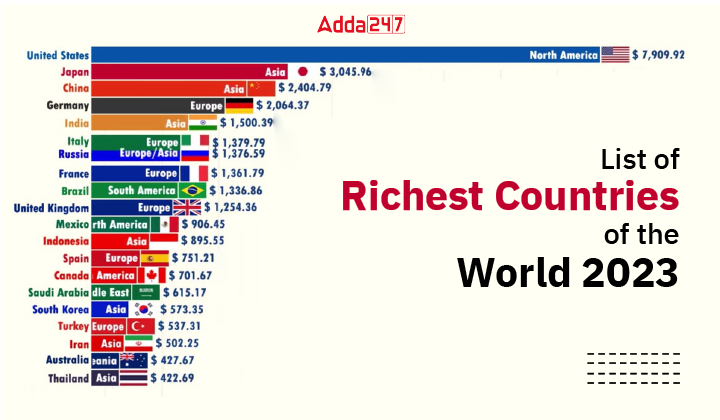
The Richest Countries in the World that have topped are not always the mightiest or the biggest countries in the world. The parameters that set apart the richest and most powerful countries are the factors like GDP and GDP Per Capita Income and so on. Thus, the mightiest of the countries may not be the wealthiest country based on their GDP & and GDP Per Capita Income and vice versa. In the following article, we will discuss the List of Richest Countries of the World 2023 based on GDP per capita income as well as the List of 10 richest countries in the world based on the GDP.
What are the parameters that indicate the List of Richest Countries of the World 2023?
There are various indicators or parameters that culminate into the rankings of the various similar List of Richest Countries of the World 2023. However, the common factors used to determine the ranking of the List of Richest Countries of the World 2023 are a country’s Gross Domestic Product or GDP (goods and services produced by a country in one year) and the GDP per capita income (the average amount of money each person of a country earns in one year). the GDP per capita income is also known as GNI or Gross National Income.
List of Richest Countries of the World 2023 (GDP Based)
Here is the List of the Richest Countries in the World 2023 based on the GDP. These countries are often considered the most powerful countries in the world because of their economic stability and immense GDP.
| Country | GDP |
| United States | $18.6 trillion |
| China | $11.2 trillion |
| Japan | $4.9 trillion |
| Germany | $3.4 trillion |
| United Kingdom | $2.6 trillion |
| France | $2.5 trillion |
| India | $2.2 trillion |
| Italy | $1.8 trillion |
| Brazil | $1.8 trillion |
| Canada | $1.5 trillion |
List of Richest Countries of the World 2023 (GDP per Capita Income Based)
Here is the List of the Richest Countries of the World 2023 based on their GDP Per Capita Income. These countries are not often the mightiest as mentioned above. Some of the countries in the following List of Richest Countries of the World 2023 are the smallest countries in the world such as Luxembourg and Singapore with 2,590 km² and 728.6 km² total area.
| Country | Per Capita GDP |
| Luxembourg | $140,694 |
| Singapore | $131,580 |
| Ireland | $124,596 |
| Qatar | $112,789 |
| Macao, SAR (Special Administrative Region) | $85,611 |
| Switzerland | $84,658 |
| United Arab Emirates | $78,255 |
| Norway | $77,808 |
| United States | $76,027 |
| Brunei Darussalam | $74,953 |
| Hong Kong, SAR | $70,448 |
| San Marino | $70,139 |
| Denmark | $69,273 |
| Taiwan | $68,730 |
| Netherlands | $68,572 |
| Austria | $64,571 |
| Iceland | $64,621 |
| Andorra | $63,600 |
| Germany | $63,271 |
| Sweden | $62,926 |
Richest Countries of the World 2023
As of 2023, the world’s richest countries are determined by various factors, including their gross domestic product (GDP), per capita income, and overall economic strength. These countries have managed to achieve high levels of prosperity and economic development. Among the top-ranking nations are the United States, China, Japan, Germany, and the United Kingdom.
The United States continues to hold its position as the world’s largest economy, with a diverse range of industries contributing to its success. It benefits from a robust financial sector, technological advancements, and a highly skilled workforce. China, the second-largest economy, has witnessed remarkable growth over the past few decades, driven by its manufacturing capabilities, export-oriented industries, and expanding consumer market.
Japan, known for its technological innovation and strong manufacturing sector, remains a significant economic powerhouse. Germany, with its well-established industrial base and exports, is a major player in Europe’s economic landscape. The United Kingdom, despite uncertainties surrounding its exit from the European Union, boasts a developed financial market, services sector, and global trade relations.
Richest Countries of the World
These countries’ economic strength not only contributes to their citizens’ prosperity but also enables them to invest in education, healthcare, infrastructure, and social welfare programs. However, it’s important to note that economic wealth does not necessarily indicate the equal distribution of resources or overall quality of life within these nations.
The rankings of the world’s richest countries can fluctuate over time due to factors such as economic policies, geopolitical shifts, and global events. Nevertheless, these countries continue to play significant roles in shaping the global economy and influencing international trade and investment.





